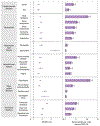An In-Depth Insight into Clinical, Cellular and Molecular Factors in COVID19-Associated Cardiovascular Ailments for Identifying Novel Disease Biomarkers, Drug Targets and Clinical Management Strategies
- PMID: 39703820
- PMCID: PMC11658003
- DOI: 10.26502/ami.936500177
An In-Depth Insight into Clinical, Cellular and Molecular Factors in COVID19-Associated Cardiovascular Ailments for Identifying Novel Disease Biomarkers, Drug Targets and Clinical Management Strategies
Abstract
COVID-19 was initially identified as a respiratory system disorder, but it has been reported to interact with and influence the cardiovascular system, in addition to many other body systems. Although COVID-19-associated cardiovascular (CV) complications are common, resulting in high acute phase mortality and a large number of morbidities in the chronic phase, thus severely impacting patients' quality of life and health outcomes, yet clinical, cellular, and molecular biological factors underlying the pathophysiology of cardiovascular complications associated with COVID-19 are poorly understood. This review investigates putative underlying clinical factors as well as cellular and molecular biological mechanisms by which COVID-19 leads to acute CV complications, including state-of-the-art genomic sequencing-based findings, and assessing the long-term CV consequences of COVID-19, aiming to shed light on developing strategies for differential diagnosis, risk prognostic stratification, prevention, and clinical management of CV sequels in COVID-19 patients. We found that the relationship between COVID-19 and CV risk is complex and multifaceted. Intriguingly, in addition to acute COVID-19 detertriuos effects, COVID-19 survivors may experience long-term CV effects as well that may have long-lasting clinical consequences. Here in this article, we provide a detailed account of a large number of genomic alterations, microRNAs, and novel viral as well as host proteins in CVDs associated with COVID-19, which has helped identify some novel drug targets to treat COVID-19-related cardiovascular complications.
Keywords: COVID-19; Cardiovascular diseases; molecular pathogenesis; pathophysiology; personalized cardiovascular medicine.
Conflict of interest statement
Competing Interest The authors have declared that no competing interests exist. Conflict of interest statement The authors declare that the research was conducted in the absence of any commercial or financial relationships that could be construed as a potential conflict of interest.
Figures







References
Grants and funding
LinkOut - more resources
Full Text Sources
